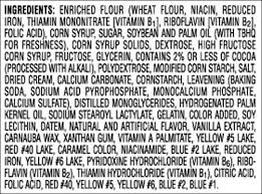|
designfitnesscentre.com
 Have you looked at the ingredients on a food label lately? How about a “processed” food label; like famous brands of cookies, cereals, or junky snack foods? Do you have those ingredients in your house? Do you even know what all of those ingredients are? There are a ton of artificial, chemical, "junky" ingredients in foods these days. If you see an ingredient called "artificial flavour," what exactly is it? For the most part, it’s a secret! Seriously! Big food companies don’t want their proprietary flavours to be known, so they’re allowed to say “artificial flavour” and leave the details out. That alone gets me upset. But what makes me more upset is what artificial flavours represent when they're in your food. I’m going to give you the real deal below. Why use "artificial flavours' in a product? When you make an apple muffin at home, what gives it the apple flavour? Apples of course! Like real, whole, chopped or shredded apples or applesauce. But, let’s say you’re a big food company and you’re making thousands of apple muffins every day. In a factory. On an assembly line. How would you process the huge amount of apples that are to be chopped, grated or made into applesauce? Would you have a separate "Apple Room" where all the apple processing happens? What if one batch is slightly riper, or tastes slightly different from the rest? Will your customers notice a different taste? Apples are perishable - they go bad. So how would you guarantee the apples won't go bad? (Remember the saying "it only takes one bad apple to ruin the whole bunch?"). And what if you can have an apple flavour that tastes better than using real apples? Something that makes people want to keep buying them every week. It's true - some of the artificial flavours are engineered to give an even better taste than the real food. Companies will often opt for the easier and more profitable option like artificial flavours. Artificial flavours last longer and will be virtually identical batch after batch. In our apple muffin example, artificial flavours used to make an apple muffin are ready to go, so you don't need to peel, cut, or worry about apples going brown, or that they're not tasting "appley" enough. Oh, and it’s way cheaper than using real, whole apples. Pro Tip: If the package says "flavoured" in the description, then the flavour is artificial. For example, "apple muffin" contains at least some apple. But, "apple flavoured muffin" contains artificial flavour and no apple. Safety of artificial flavours While there are some flavours banned for use in many countries, other countries allow them. There is an approved list of flavours that are accepted to be safe, and are used by the food industry. They are considered GRAS, or “generally recognized as safe.” Even if they are 100% safe to ingest, the mere fact that an artificial flavour is in food makes it an artificial food. It's not a real, whole food. Having an artificial flavour as an ingredient almost defines that food to be a processed, "food-like product." Sometimes referred to as "junk." Artificial flavours in food indicate that the food, regardless of the marketing, or health claims, is not a healthy choice. Conclusion Big food companies use artificial flavours to reduce costs, make the manufacturing process simpler, reduce waste and even enhance flavour way beyond what the natural ingredient would taste like. They are not added to improve the “healthfulness” or nutrition of the food. Artificial flavours in the ingredient list indicate that the food is not going to optimize your health. These processed foods are most certainly “junk.” References: https://authoritynutrition.com/9-ways-that-processed-foods-are-killing-people/ https://authoritynutrition.com/junk-foods-chemical-engineers/ http://www.inspection.gc.ca/food/labelling/food-labelling-for-industry/common-name/snack-foods/eng/1348251469504/1394902794643 https://ehp.niehs.nih.gov/121-a126/
0 Comments
Your comment will be posted after it is approved.
Leave a Reply. |
|
Contact TERRY |
SubscribeJoin our mailing list today!
|
